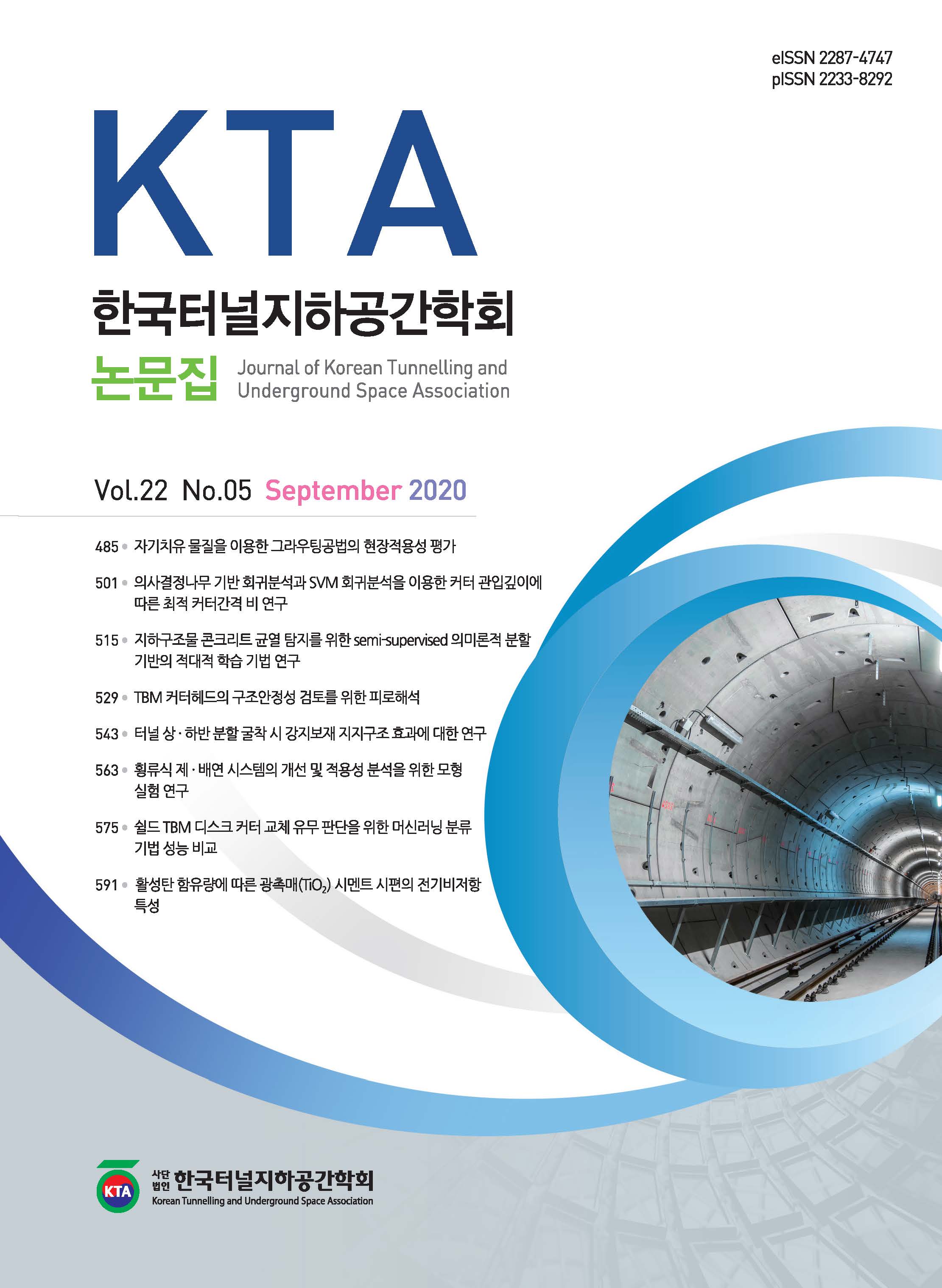(사)한국터널지하공간학회
- Log In/Sign Up
- P-ISSN2233-8292
- E-ISSN2287-4747
- KCI
 ISSN : 2233-8292
ISSN : 2233-8292
Article Contents
- 2024 (Vol.26)
- 2023 (Vol.25)
- 2022 (Vol.24)
- 2021 (Vol.23)
- 2020 (Vol.22)
- 2019 (Vol.21)
- 2018 (Vol.20)
- 2017 (Vol.19)
- 2016 (Vol.18)
- 2015 (Vol.17)
- 2014 (Vol.16)
- 2013 (Vol.15)
- 2012 (Vol.14)
- 2011 (Vol.13)
- 2010 (Vol.12)
- 2009 (Vol.11)
- 2008 (Vol.10)
- 2007 (Vol.9)
- 2006 (Vol.8)
- 2005 (Vol.7)
- 2004 (Vol.6)
- 2003 (Vol.5)
- 2002 (Vol.4)
- 2001 (Vol.3)
A study on the feasibility evaluation technique of urban utility tunnel by using quantitative indexes evaluation and benefit ‧ cost analysis
- Downloaded
- Viewed
Abstract
If a new utility tunnel is planned for high density existing urban areas in Korea, a rational decision-making process such as the determination of optimum design capacity by using the feasibility evaluation system based on quantitative evaluation indexes and the economic evaluation is needed. Thus, the previous study presented the important weight of individual higher-level indexes (3 items) and sub-indexes (16 items) through a hierarchy analysis (AHP) for quantitative evaluation index items, considering the characteristics of each urban type. In addition, an economic evaluation method was proposed considering 10 benefit items and 8 cost items by adding 3 new items, including the effects of traffic accidents, noise reduction and socio-economic losses, to the existing items for the benefit ‧ cost analysis suitable for urban utility tunnels. This study presented a quantitative feasibility evaluation method using the important weight of 16 sub-index items such as the road management sector, public facilities sector and urban environment sector. Afterwards, the results of quantitative feasibility and economic evaluation were compared and analyzed in 123 main road sections of the Seoul. In addition, a comprehensive evaluation method was proposed by the combination of the two evaluation results. The design capacity optimization program, which will be developed by programming the logic of the quantitative feasibility and economic evaluation system presented in this study, will be utilized in the planning and design phases of urban community zones and will ultimately contribute to the vitalization of urban utility tunnels.
- keywords
- 도심지 공동구, 타당성 평가, 정량적 지표평가, 최적 설계용량, 경제성 평가, Urban utility tunnel, Feasibility evaluation, Quantitative indexes evaluation, Optimum design capacity, Economic evaluation
Reference
1. Cho, C.Y., Sim, Y.J., Kim, H.K., Lee, P.Y., Lee, M.J. (2018), “Analysis of importance by category for quantitative economic evaluation of multi-utility tunnel”, Journal of Korean Tunnelling and Underground Space Association, Vol. 20, No. 1, pp. 119-130.
2. Chung, J.S., Na, G.T. (2018), “A study on the feasibility assessment model of urban utility tunnel by analytic hierarchy process”, Journal of Korean Tunnelling and Underground Space Association, Vol. 20, No. 1, pp. 131-144.
3. Kang, Y.K., Choi, I.C. (2015), “Economic feasibility of common utility tunnel based on cost-benefit analysis”, Journal of the Korean Society of Safety (KOSOS), Vol. 30, No. 5, pp. 29-36.
4. Lee, S.W., Sim, Y.J., Na, G.T. (2017), “A fundamental study on the development of feasibility assessment system for utility tunnel by urban patterns”, Journal of Korean Tunnelling and Underground Space Association, Vol. 19, No. 1, pp. 11-27.
5. Seong, J.H., Jung, M.H. (2017), “Determination of priorities for management to reduce collapse accident of open excavation and road sink in urban areas”, Journal of Korean Tunnelling and Underground Space Association, Vol. 19, No. 3, pp. 489-501.
6. Saaty, T.L. (2008), “Decision making with the analytic hierarchy process”, International Journal of Services Sciences, Vol. 1, No. 1, pp. 83-98.
7. Seoul Metropolitan Government (2014), A report of the feasibility and basic planning establishment for urban utility tunnels in Seoul, Seoul Metropolitan Government, pp. 100-115.
8. Sim, Y.J., Jin, K.N., Choi, D.C., NA, G.T., Cho, Y.C. (2016), “Development of optimal design capacity assessment algorithm for urban multi-utility tunnel construction”, Proceedings of the 2016 General Assembly and Annual Spring Conference of Korean Tunneling and Underground Space Association, Seoul, pp. 127-128.
9. Sim, Y.J., Jin, K.N., Oh, W.J., Cho, C.Y. (2017), “Development of evaluation model for optimum design of multi-utility tunnel in urban area”, Journal of Korean Tunnelling and Underground Space Association, Vol. 19, No. 3, pp. 437-447.
10. Sim, Y.J., Jin, K.N., Oh, W.J., Cho, C.Y. (2018), “Optimal alternative decision technique of accommodation facility in multi-utility tunnel using VE/LCC analysis”, Journal of Korean Tunnelling and Underground Space Association, Vol. 20, No. 2, pp. 317-329.
- Downloaded
- Viewed
- 0KCI Citations
- 0WOS Citations
